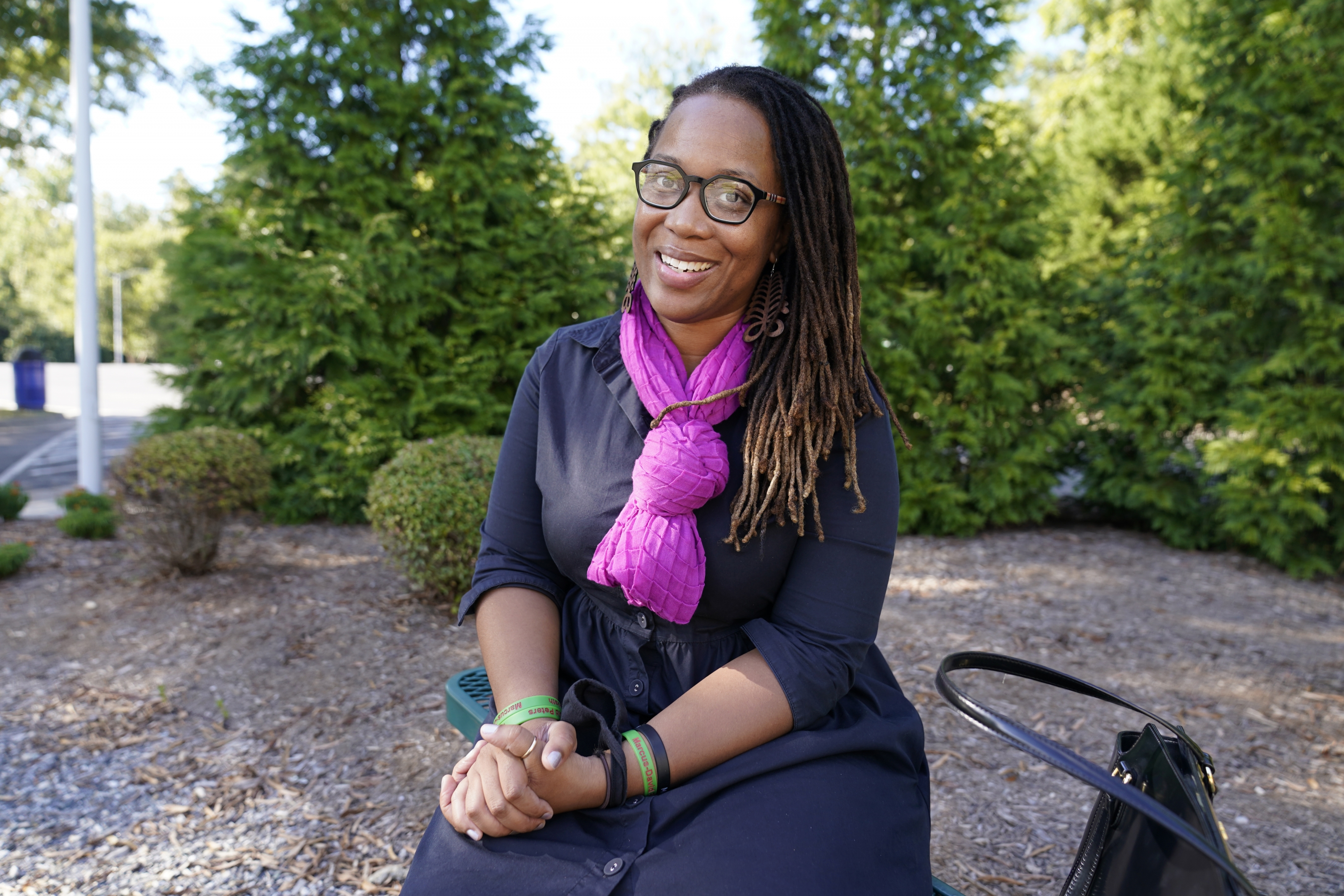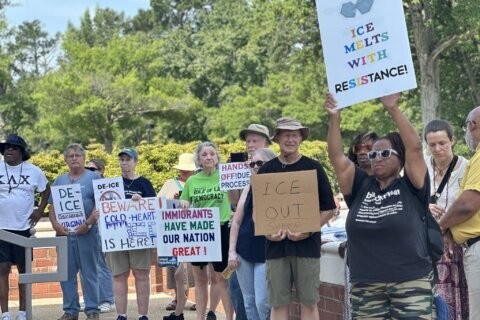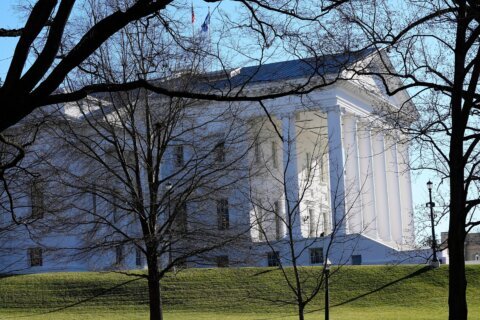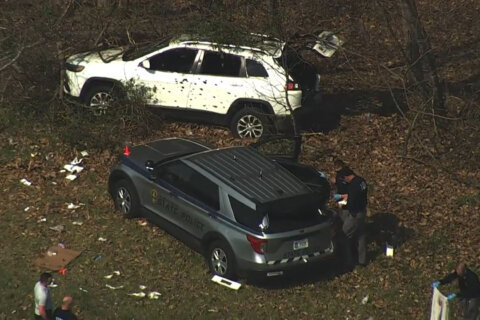
EDITOR’S NOTE: Virginians have a few days left to vote for the commonwealth’s statewide offices — governor, lieutenant governor and attorney general. Seven candidates for those seats — gubernatorial candidates Terry McAuliffe, Glenn Youngkin and Princess Blanding; lieutenant governor candidates Haya Ayala and Winsome Sears, and attorney general candidates Mark Herring and Jason Miyares — sat for conversations with WTOP’s Nick Iannelli.
As is generally the case, there has been no shortage of attacks in the Virginia campaign, and no shortage of places to find out about them. Some of that is fair game and important to know; some of it, not so much; some of it isn’t true. What we’ve done here is keep phrases such as “my opponent wants …” and “my opponent says …” to an absolute minimum. You’re getting the candidates’ views on themselves, what they would do in office and why they want to do it.
Princess Blanding’s decision to run for governor of Virginia grew out of a promise she made at her brother’s grave.
Blanding, the Liberation Party candidate for governor, is the sister of Marcus-David Peters, a high school biology teacher who was shot and killed by the Richmond police in 2018 while he was suffering an emotional crisis.
Read Nick Iannelli’s interviews with Blanding’s opponents, Democrat Terry McAuliffe and Republican Glenn Youngkin.
In a conversation with WTOP’s Nick Iannelli, Blanding pointed out that Peters was unarmed, completely undressed and had already been hit by a car, and that the officer who shot him said on body-camera footage that Peters appeared to be suffering from a mental health crisis.
“My brother had no weapon,” Blanding told WTOP. “The only weapon he had on him was his brown skin.”
The shooting of Peters was ruled justified twice, but Blanding continued to work for change: “I made a promise to my brother at his grave site. And I said, ‘I will not back down and I will fight for justice.’”
The murder of George Floyd by the Minneapolis police in 2020 only added fuel to what Blanding calls “the uprise.” As a prominent activist, she said, many Virginia legislators and officials “reached out to me to work on different (reform) bills — you know, out of fear of the uprise. And what we got was watered-down legislation, or they killed the bills altogether.”
Last December, Gov. Ralph Northam signed the Marcus-David Peters Act, which aims to involve mental health professionals in place of the police during behavioral health emergencies. Blanding spoke at the signing ceremony and called the bill “ineffective” and told the assembled officials they had done “exactly what this racist, corrupt and broken … system expected you all to do.”
“Their actions were very performative,” Blanding told Iannelli, speaking of lawmakers, “ … and I got tired of it.”
She said she wasn’t intending to run for governor, much less start the Liberation Party, but “I just knew that we couldn’t keep doing the same thing and expect different results, and that we couldn’t keep begging our oppressors to be our saviors because they keep showing us time and time again that they [will] not.”
“We decided that we’re going to expand our fight from the streets and into the seats of these key elected positions, to claim what we deserve,” Blanding added. And regardless of the result of her election, she said, “We want to continue to enlighten, empower, and mobilize more Virginians to take on these key elected positions on a local and state level.”
New rules
The rules for getting on the ballot in Virginia this year were different from previously — 2,000 petition signatures were required rather than the previous standard of 10,000 — and that put the ballot within Blanding’s reach. Still, she said, the fact that candidates need signatures from all 11 congressional districts meant a lot of work for a startup party.
“And so we had to work a million times harder than the other two candidates that already have a support base that will vote blue no matter who, that will go red no matter who. But because we had to do this from scratch, we had to be really, really smart, and we put in overtime, to make sure that we got those signatures.”
Still, Blanding said, she connected.
“We knocked on doors blindly, because we could not afford the money to purchase voter registration information. But that turned out to be a blessing. Because as we were knocking on doors blindly across the Commonwealth, we didn’t know if it was the door of a Republican, Democrat, independent or somebody who gave up. But … nine out of 10 people who just took a moment to listen, they signed. We have so many signatures from Republicans, we have so many signatures from Democrats … because people understand that what we’re fighting for is equity and humanity.”
‘I refused to play the games’
Blanding probably got on a lot of people’s radar at the second debate between Democratic and Republican gubernatorial candidates Terry McAuliffe and Glenn Youngkin, when she interrupted the debate from her spot in the audience and had to be taken out of the auditorium by security.
She said the Northern Virginia Chamber of Commerce, which put on the debate, did not invite her to participate but gave her a seat in the crowd, which she likened to being offered to sit in “the back of the bus.” She claimed she didn’t accept the condition not to speak, and pointed out that 26% of respondents to a recent University of Mary Washington poll considered themselves independents.
“I knew that I was going to interrupt it because I refused to play the games of the duopoly. Because the games of the duopoly are meant to keep the voices of the unheard suppressed. They’re meant to make sure that third-party candidates have no chance. … The censorship of my candidacy is racist, sexist, and it’s oppressive. And it’s a way to make Virginians think that — you know what? You only have two options.”
Blanding said the Liberation Party is statewide so far, but the plan is to make a nationwide concern.
“My team is very small, but we’re very powerful.”









